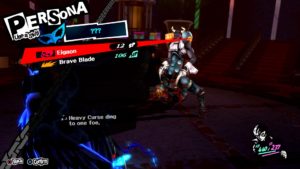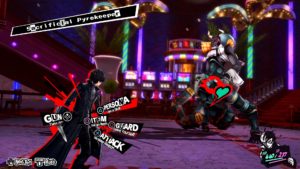By Niccole Carner

When I began working at the University of Wisconsin-Madison Writing Center this past fall (2017), I was in the midst of my first play-through of Persona 5, a Japanese role-playing game developed by Atlus Games for the PlayStation 4. My approach to the first weeks of teaching was subtly and inadvertently influenced by the mechanics of this game, which were constantly on my mind. The phenomenon was not new to me, in fact, I had been in this state of video game hyper-association before when revising my dissertation. I knew a few things for certain: 1) I would lose a lot of sleep prioritizing finishing the game as soon as possible, and 2) I would learn a lot from this game, and the (borderline) obsession would shape my approach to teaching and writing. [Want to read more about framing academic work in terms of nerdy games? Check out this great article on grad school and D&D.]

In Persona 5 the characters have two sources of power/energy which are tracked by power bars. The HP or “hit points”—basically the health of the character—and the SP or “spirit points” —basically the psychological force or willpower of the character. Each attack takes a certain number of HP or SP—a “spell” for example, can cost a character 45 SP. Since they have a finite pool of points, this mechanic limits the number of spells they can cast throughout an adventure. Now, these spirit points can be regained through magic items, but such items are rare, so the gamer has to use their SP skills sparingly in order to get through each location.

After spending over 70 hours of my summer playing Persona 5, I began to think of my own life in terms of HP and SP. If I am healthy and well-rested, my HP is full. It can drop if I skip a meal or have a headache, but usually, my HP is pretty high. My SP (or as I like to think of it, “Social Points”) on the other hand are a cherished commodity. Teach a class? Use 50 SP per class. Awkward office hours conversation about a paper grade, blow through 100 SP in one shot. Unbearably long meeting? Use 25 SP. On certain days my SP tracker was dangerously low by 5 PM. Since there are ways to build up your SP throughout the game, and I started taking stock of how I replenished my “SP” throughout the day. Manage to sneak away and buy a delicious cold brew coffee: +15 SP. Read an inspiring blog post between classes taught: +10 SP. Skim Instagram for pictures of baby Highland cows or kittens: +10 SP. The problem is the small moments of gaining SP barely put a dent in the in the amount I lost during the day. So ultimately, how does a hardcore introvert (like me) at the end of a long day have the energy, the SP, to be able to interact one-on-one with students, and to connect with them?
At our Writing Center training, we were encouraged to greet each student enthusiastically and to ask questions to get to know the writer. The reasoning for this is sound—the writing tutor should care about the student holistically and get to know the writer as a student, and as a person. The thing is, small talk is a high-cost SP action. It takes a lot out of anyone to get to know new students

within a short period of time (and at our writing center, up to six new students within a three-hour block). I was terrified when I first started that I would be too socially drained to connect with anyone. In Persona 5 the main ways SP can be replenished are by taking a long rest, which is not possible in the middle of a Writing Center shift, and returning another day to continue the infiltration, or by consuming a magic, and extremely rare, item, which seems even more unlikely in the Writing Center. This is where I was wrong—I underestimated the SP-building power of the students themselves.
My first two weeks of tutoring sessions, I would enter the Writing Center with very specific goals to make sure I was engaging the students during my evening shifts. I would have a post-it note emblazoned with “Ask good questions! Really listen! Engage!” stuck to my laptop screen, to not-so-subtly remind myself to focus on engaging when I knew my SP was dangerously low. The thing was, I never looked at my post-it notes, but instead, I was actively listening and engaging with the students and asking probing questions. I found myself feeding off the energy the students gave off: excited energy about applying to graduate programs +50 SP, visible joy at writing a good topic sentence +75 SP, hearing that the session was helpful +100 SP. Each session built me up, without me even noticing.

These unexpected power boosts throughout each session shape the way I now enter the Writing Center to start my tutoring shifts. I am no longer nervous about my ability to connect with a student but instead am strengthened by the possibility of who I may meet, and what they may bring to the table. Often, as writing instructors, we feel the pressure to have all the answers, and to be the sole source of power within a session. My (borderline) obsessive connection to Persona 5 paralleled my start at the Writing Center and gave me a unique opportunity to see the strength and wisdom within each student I tutor, and to be open to each of them shaping my life and my work just as much as I seek to shape theirs. Though I still show-up with a cold brew coffee, just in case.


I work for this SEO Melbourne and these writing tips are really helpful. The post is something like based on experience. Honestly, I can see myself to some of the situations mentioned here.
Niccole, thanks for sharing these enjoyable insights connecting writing center work with RPG status trackers! It’s a surprising connection that encourages me to think in new ways about mental energy I devote to writing center tutorials.
I’ve personally found that application tutoring (i.e., helping set up a specific writing task for the student and then excusing myself to stretch my legs and get some water while the writer writes) can be immensely valuable for picking up at least +15 SP. When I return I’ve benefited from seeing a different part of the writing center, chatting briefly with a colleague, or reflecting on the session in progress. And most of the time the writer has benefited from actually getting a little bit of work done. + SP for all!
A great point, Matthew! I say the more we can boost one another’s SP the better (for us and for the writers).
Niccole, what a neat, creative way of thinking about the physical, mental, and emotional energy we expend in academic work. One of the things that surprised me most when I first started writing center tutoring was just how exhausting those three hours can be. There is something quantitatively and qualitatively different about the energy required of one-and-one sessions as opposed to teaching a large group.
I, in fact, do something quite similar to you: I use a task-management game called Habitica to keep track, not only of my to-do lists, but also of things that sustain me that I easily neglect (sleep, etc.). Because I think of writing as a comprehensive activity—involving our minds, bodies, and emotions all entangled together—I agree it’s important to stay attuned to energy levels… for ourselves and in how we guide students who often need these “power boosts” as well.